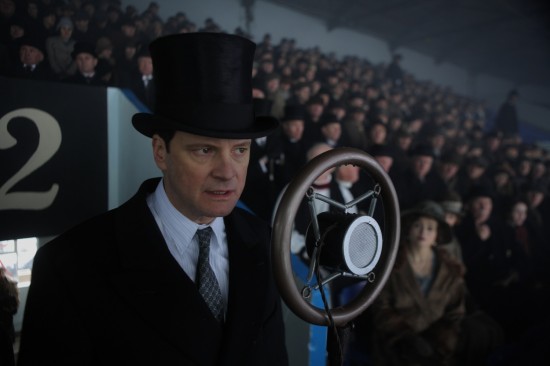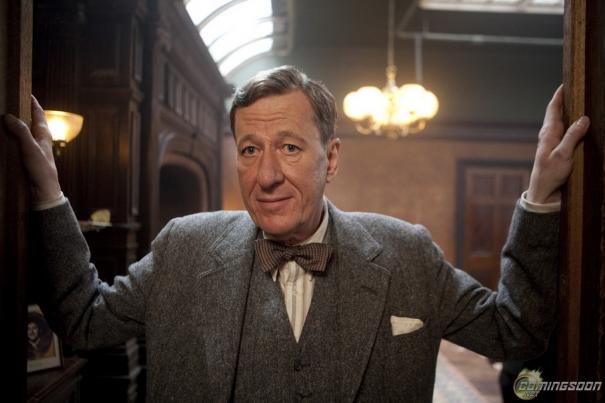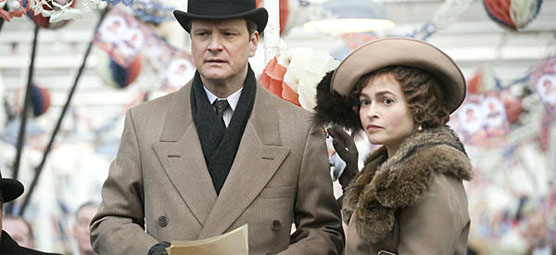Our democratic sensibilities and admiration of equality often lead us to prefer dramas about the Everyman: from Arthur Miller’s Death of a Salesman to Winter’s Bone. We place value in artists who find great drama in little people. And if positions of greatness and stature are attained, they are usually won through hard-fought exertion. Nothing makes a better Hollywood film than an affirmation of a world that reflects back at us the meritocracy in which we firmly believe (or hope).
On the other hand, our cousins across the pond, the British, still treasure the increased magnitude personal stature brings to great drama. And while Princess Diana was beloved precisely because she was perceived as an every-woman, the country can still turn out movies like The Queen, which churns up a Greek sense of pathos by placing at stake the life of a person whose position of power has consequences not merely in the personal or familial spheres, but also in the realm of public life: the nation, the empire, the world.
 Tom Hooper – the director behind the much-loved television series biography of John Adams – continues this tradition with his latest movie, the wonderful The King’s Speech. It is a film whose depth of feeling is greatly intensified and enriched by the significance of the man at hand. Colin Firth plays King George VI, the unlikely heir to the British throne in the dawning days of World War II. It is a time in which legislative power has long passed from the crown, and yet the king still stands as a symbol of national pride and unity. It could be said, therefore, that the king’s greatest role in the modern monarchy is to act as a national mascot and coach, uniting the country through his presence, and with the advent of radio and television, his words.
Tom Hooper – the director behind the much-loved television series biography of John Adams – continues this tradition with his latest movie, the wonderful The King’s Speech. It is a film whose depth of feeling is greatly intensified and enriched by the significance of the man at hand. Colin Firth plays King George VI, the unlikely heir to the British throne in the dawning days of World War II. It is a time in which legislative power has long passed from the crown, and yet the king still stands as a symbol of national pride and unity. It could be said, therefore, that the king’s greatest role in the modern monarchy is to act as a national mascot and coach, uniting the country through his presence, and with the advent of radio and television, his words.
Words. So intrinsically necessary to the exercise of the royal office, and yet, for King George, they are the great toil of his existence. King George, known as Albert (or Bertie to his friends) before ascending to the throne, was a stutterer and a stammerer, and the speech impediment paralyzed him not only during public speaking, but in stressful casual conversation as well. The King’s Speech tells the story of how Bertie sought to rectify this impediment, eventually enlisting the help of Lionel Logue (Geoffrey Rush), an unconventional speech coach.
The many exchanges between Bertie and Lionel are the heart of Hooper’s movie, and in this relationship, we see many things happen. There is, of course, the humorous and very gradual speech education, but we also watch the wearing down of boundaries of class and society; the breaking through to a lonely isolated man; an education in social manners, affection, and, eventually, fraternal love. The King’s Speech is the story of a king’s education in the ways of common humanity, the discovery of personal tenderness by a man who has lived his years within a cocoon of propriety and regal formality.
 With the warm and human performances by Colin Firth and Geoffrey Rush, The King’s Speech provides two of the year’s best acted roles. Always playing through a veil of formality, Firth’s Bertie ducks and dives between a variety of protective cloaks. His stature and grace are in constant flux, bending and transforming to the pressures of various settings. Performing a role with a physical handicap often raises the general esteem of an actor’s performance (Tom Hanks, after all, won an Oscar for that wishy-washy sentimentalist, Forrest Gump), but here Firth’s handicap is not the focus or defining attribute of the performance. Rather, like the character he plays, Firth seems to be always struggling with the impediment, as if it were blocking him from truly being Bertie, just as it prevented Bertie from truly presenting his true self. In this struggle, the actor and the character become united in spirit, enabling Firth to bring us deeply into the many colors and contours of Bertie’s pain and sorrow.
With the warm and human performances by Colin Firth and Geoffrey Rush, The King’s Speech provides two of the year’s best acted roles. Always playing through a veil of formality, Firth’s Bertie ducks and dives between a variety of protective cloaks. His stature and grace are in constant flux, bending and transforming to the pressures of various settings. Performing a role with a physical handicap often raises the general esteem of an actor’s performance (Tom Hanks, after all, won an Oscar for that wishy-washy sentimentalist, Forrest Gump), but here Firth’s handicap is not the focus or defining attribute of the performance. Rather, like the character he plays, Firth seems to be always struggling with the impediment, as if it were blocking him from truly being Bertie, just as it prevented Bertie from truly presenting his true self. In this struggle, the actor and the character become united in spirit, enabling Firth to bring us deeply into the many colors and contours of Bertie’s pain and sorrow.
Firth’s performance is furthered by Rush, and the two develop a well-wrought interpersonal world that plays out it in the confines of the speech therapist’s chambers. Rush is sharp-tongued, witty, balanced, poised, and bright. He bears a lightness of soul, and yet there is a prideful suspicion of the king’s stature and bullish personality that seems to simmer deep below his surface, never quite boiling up, just coming ever so slightly into view at times.
Actors cannot accomplish what Firth and Rush do in this film without the necessary tools, which are provided by David Seidler’s screenplay and Hooper’s direction. Hooper doesn’t play any tricks with his camera. Certain scenes play out like staged readings, allowing the performances to shine forth. At other moments — in the palace or at a royal party — Hooper’s camera moves like a dancer through a ballroom, passing quickly by the film’s rich historical detail. This isn’t an actor’s studio piece, and Hooper’s backdrop is as important in achieving the rich mood of the film as are the lead actors’ performances.
Shining here also is Helena Bonham Carter as Bertie’s wife, Queen Elizabeth. Bonham Carter, whose wit matches the pizzazz of a former-flapper with the good sense of a crafty politician, reminds us, like all the characters in The King’s Speech, that great high-stakes drama can be serious, moving, and profound, while still retaining that all-essential quality of a good movie: it is bloody fun to watch.






